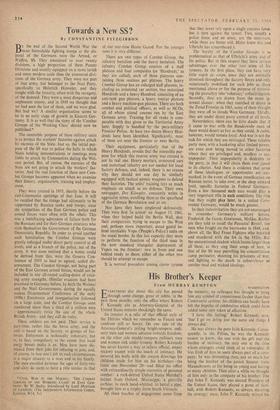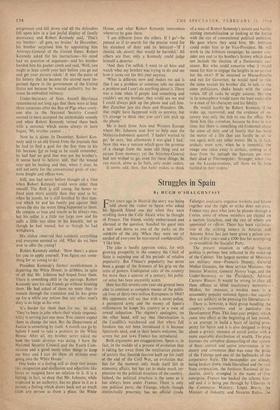His Brother's Keeper
From MURR
A Y KEMPTON
WASH INCITON
VERYTHING else about this city has passed E,through some change, great or subtle, in the past three months; only the office where Robert F. Kennedy sits as Attorney-General of the United States remains shockingly the same.
Its interior is a relic of that official style of the Thirties which we remember as Fascist and confront still as Soviet. On one side of the Attorney-General's ceiling bright-tempera ordi- nary men and women advance towards freedom; on the other side muddy-tempera ordinary men and women sink under tyranny. Robert Kennedy has never known a way to relieve official, empty majesty except with the touch of intimacy. He covered his walls with the crayon drawings his children made for him on his birthdays—the latest one November 20—and filled his office with extraordinarily simple souvenirs of personal combat: a rock-dented United States Marshal's helmet from Oxford, Mississippi; a guerrilla carbine, its stock hand-whittled, its barrel a pipe, brought him as a trophy from South Vietnam.
All these touches of engagement come from the memory; no colleague has thought to bring him any symbol of commitment fresher than that Communist carbine; his children can hardly have felt the impulse,of celebration which could have added Some new token of affection.
`I have this feeling,' Robert Kennedy says, `that I go on doing just the same old things always did.'
He was always the pure Irish Kennedy. Conse- quently, in the Fifties, he was the Kennedy easiest to know, the one with the gift and the burden of intimacy, the only one at the time whom strangers could think of as vulnerable. It vas Irish of him to seem always part of a com- pany; he was interesting then, not so much for being the brother of the junior Senator from Massachusetts as for being so young and having so many children. Then after a while we thought of him only in the company of his brother. The day John F. Kennedy was elected President of the United States, they played a game of foot- ball, with Robert Kennedy, as always, dictating the strategy; once, John F. Kennedy missed his
assignment and fell down and all the defenders fell upon him in a last joyful display of family democracy and Robert Kennedy said, 'That's my brother: all guts, no brains.' In December, his brother surprised him by appointing him Attorney-General of the United States. Robert Kennedy asked for his instructions—his mind had no question of argument—and his brother handed him his pocket comb and said, 'Well, you might at least comb your hair before you go out and get your picture takeh.' It was the point of his history that he became the second most im- portant figure in the government of the United States not because he wanted authority, but be- cause he embodied intimacy.
Under-Secretary of State. Averell Harriman remembered not long ago that there were at least three occasions after the Bay of Pigs when every- one else in the National Security Council seemed to have accepted the unthinkable remedy and when Robert Kennedy turned them back with a sentence which seems always to have begun, 'My brother cannot . .
Now he is alone. In December, Robert Ken- nedy said to an old friend from the journals that he had to find a goal for the first time in his life because, for as long as he could remember, he had had no goal that was not his brother's. It seems hard to believe, still, that the wound may not be healing and that, when it does, he will not settle for the conventional goals of elec- tions fought and offices won.
Still, one had never before thought of a time when Robert Kennedy could seem older than oneself. The flesh is still young, the bones re- fined even more acutely than they used to be; when he stands, he is still fortified by that ram- rod which he and his family put against their spines the day the worst thing happened to them. He remains as lean and tensile as he always was, but his collar is a little too large now and his cuffs a little too close to his knuckle, not as though he had wasted, but as though he had withdrawn.
His visitor observed that suddenly everything and everyone seemed so old. What do we have now to offer the young?
Robert Kennedy smiled: 'Now there's a place for you to apply yourself. You figure out some- thing for us young to do.' ' President Kennedy's former establishment is departing the White House, in dribbles, in spite 'of all that Mr. Johnson had hoped from them. There is something chill in the partings. Robert Kennedy sees his old friends go without blaming them. He had asked of them no more than to remain through the transition and he has given up for a while any notion that any other man's duty is as large as his own.
'It's harder for them than for me,' he said. 'They've been in jobs where their whole responsi- bility is serving just one man. You cannot expect them to change the man. But the Department of Justice is something by itself. A month can go by before I need to take a problem to the White House. After all, my brother never asked me how the lands division was doing. I have the National Security Coimcil and the Youth Com- mission and a good many other things to keep me busy and I can do them all without ever going into the White House.'
One looks at a feeling still so deep that nouns like resignation and disillusion and adjectives like bitter or resigned have no relation to it. It is a feeling, in fact, so deep that Mr. Johnson, while respected as an authority, has no place in it as a person, a feeling which draws back not so much from any person as from a place, the White House, and what Robert Kennedy remembers whenever he goes there.
'I am different from the others. If I go'—he paused as if to search for the precise word for his standard of duty and its betrayal—'If I should, uh, desert, that would be harmful.' All others are free; only a Kennedy could judge himself a deserter.
'And then I'm selfish. I want to sit here and watch what my brother was trying to do and see how it turns out for this year anyway.
'What is different now and makes me sad is that I see a problem or someone, tells me about a problem and I can't do anything about it. There was a time when if people had something and couldn't see my brother, they could sec me and I could always pick up the phone and call him. But Zanzibar just sits there and flounders. Oh, that might have happened with us anyway, but it's strange to think that you can't just pick up the phone.'
He is back from Asia and Western Europe where Mr. Johnson sent him to help ease the Malaysia-Indonesia quarrel. hadn't wanted to go,' he says, 'but afterwards I was .glad 1 had,' Now this was a venture which gave the promise of a change from the same old thing and an escape from memory; yet the Attorney-General had not wished to go, even for these things; he can march, alone as he feels, only under orders.
It seems odd, then, that habit makes us think of a man of Robert Kennedy's nature and barely- stirring immobilisation as looking at the future with the eye of conventional political ambition. He goes where they send him; Mr. Johnson could order him to be Vice-President. He will work in the Johnson campaign; he cannot con- sider any end to his brother's history which does not include the election of a Democratic suc- cessor. But who could conceive what it would mean for him to engage the heights in no service but his own? If he returned to Massachusetts and ran for Governor, he would need to ride the same rounds his brother did, to talk to the same politicians, shake hands with the Same voters. Of all tasks he might assume, this one in its atmosphere would seem the least endurable to a man of his character and his fidelity.
He would hardly be Robert Kennedy if he woke up, recovered, and the evidence of re- covery was only the itch to run for office. We think him like ourselves, because he lives in our time; but there is something old-fashioned about the sense of duty and of family that has been the motor of a life that can hardly be set to run again with any other motor. He is, in fact, archaic; even now, when he is immobile. the image one takes away is archaic, coming as it does from the epitaph the Spartans put over their dead at Thermopyke: 'Stranger, when you see the Lacediemonians, tell them we lie here faithful to their orders.'







































 Previous page
Previous page